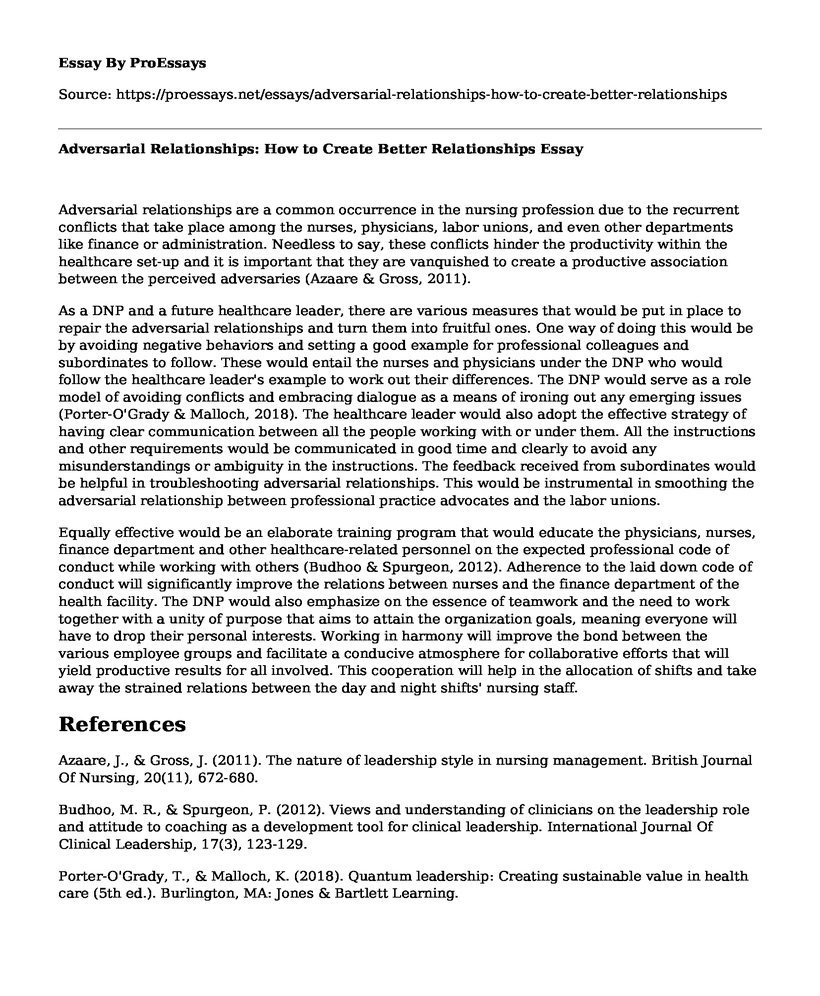Adversarial relationships are a common occurrence in the nursing profession due to the recurrent conflicts that take place among the nurses, physicians, labor unions, and even other departments like finance or administration. Needless to say, these conflicts hinder the productivity within the healthcare set-up and it is important that they are vanquished to create a productive association between the perceived adversaries (Azaare & Gross, 2011).
As a DNP and a future healthcare leader, there are various measures that would be put in place to repair the adversarial relationships and turn them into fruitful ones. One way of doing this would be by avoiding negative behaviors and setting a good example for professional colleagues and subordinates to follow. These would entail the nurses and physicians under the DNP who would follow the healthcare leader's example to work out their differences. The DNP would serve as a role model of avoiding conflicts and embracing dialogue as a means of ironing out any emerging issues (Porter-O'Grady & Malloch, 2018). The healthcare leader would also adopt the effective strategy of having clear communication between all the people working with or under them. All the instructions and other requirements would be communicated in good time and clearly to avoid any misunderstandings or ambiguity in the instructions. The feedback received from subordinates would be helpful in troubleshooting adversarial relationships. This would be instrumental in smoothing the adversarial relationship between professional practice advocates and the labor unions.
Equally effective would be an elaborate training program that would educate the physicians, nurses, finance department and other healthcare-related personnel on the expected professional code of conduct while working with others (Budhoo & Spurgeon, 2012). Adherence to the laid down code of conduct will significantly improve the relations between nurses and the finance department of the health facility. The DNP would also emphasize on the essence of teamwork and the need to work together with a unity of purpose that aims to attain the organization goals, meaning everyone will have to drop their personal interests. Working in harmony will improve the bond between the various employee groups and facilitate a conducive atmosphere for collaborative efforts that will yield productive results for all involved. This cooperation will help in the allocation of shifts and take away the strained relations between the day and night shifts' nursing staff.
References
Azaare, J., & Gross, J. (2011). The nature of leadership style in nursing management. British Journal Of Nursing, 20(11), 672-680.
Budhoo, M. R., & Spurgeon, P. (2012). Views and understanding of clinicians on the leadership role and attitude to coaching as a development tool for clinical leadership. International Journal Of Clinical Leadership, 17(3), 123-129.
Porter-O'Grady, T., & Malloch, K. (2018). Quantum leadership: Creating sustainable value in health care (5th ed.). Burlington, MA: Jones & Bartlett Learning.
Cite this page
Adversarial Relationships: How to Create Better Relationships. (2022, Jun 05). Retrieved from https://proessays.net/essays/adversarial-relationships-how-to-create-better-relationships
If you are the original author of this essay and no longer wish to have it published on the ProEssays website, please click below to request its removal:
- Religious Leadership Research Paper
- Business Ethics Essay
- Paper Example on Health Facilities in South Carolina
- Production Method and the Best Technique for Manufacture Essay
- Paper Example on Strategic Planning in the External Environment
- Essay Sample on Tech Advances in Healthcare: Improving Lives & Increasing Quality
- Behold! A Parent's Dream: My Son Achieves Milestone at Finals! - Essay Sample







